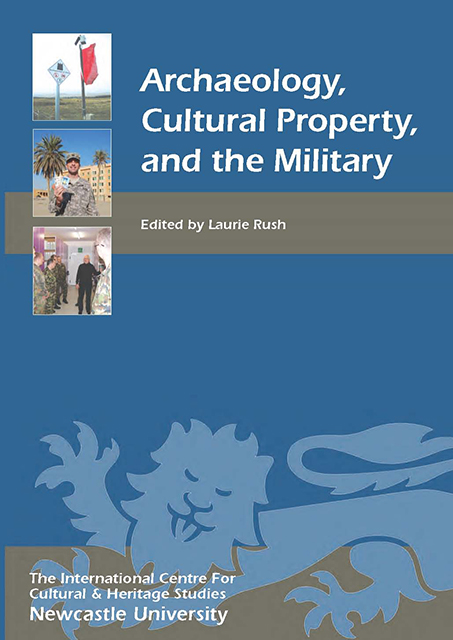Book contents
- Frontmatter
- Contents
- List of Illustrations: Figures and Tables
- Archaeology and the Military: An Introduction
- 1 The Obligations Contained in International Treaties of Armed Forces to Protect Cultural Heritage in Times of Armed Conflict
- 2 Rescuing Europe’s Cultural Heritage: The Role of the Allied Monuments Officers in World War II
- 3 The UK’s Training and Awareness Programme
- 4 US Army Civil Affairs: Protecting Cultural Property, Past and Future
- 5 Cultural Property Protection in the Event of Armed Conflict: Deploying Military Experts or Can White Men Sing the Blues?
- 6 Good Training and Good Practice: Protection of the Cultural Heritage on the UK Defence Training Estate
- 7 In-Theatre Soldier Training through Cultural Heritage Playing Cards: A US Department of Defense Example
- 8 Dealing the Heritage Hand: Establishing a United States Department of Defense Cultural Property Protection Program for Global Operations
- 9 Teaching Cultural Property Protection in the Middle East: The Central Command Historical/Cultural Advisory Group and International Efforts
- 10 Cultural Resources Data for Heritage Protection in Contingency Operations
- 11 Time not on my Side: Cultural Resource Management in Kirkuk, Iraq
- 12 US Military Support of Cultural Heritage Awareness and Preservation in Post-Conflict Iraq
- 13 Operation Heritage
- 14 Cultural Property Protection in the Event of Armed Conflict – Austrian Experiences
- 15 The Role of the Swiss Armed Forces in the Protection of Cultural Property
- 16 Preserving Global Heritage from Space in Times of War
- Appendix 1 1954 Hague Convention and its two Protocols
- Appendix 2 Author Biographies
- Index
16 - Preserving Global Heritage from Space in Times of War
Published online by Cambridge University Press: 28 February 2023
- Frontmatter
- Contents
- List of Illustrations: Figures and Tables
- Archaeology and the Military: An Introduction
- 1 The Obligations Contained in International Treaties of Armed Forces to Protect Cultural Heritage in Times of Armed Conflict
- 2 Rescuing Europe’s Cultural Heritage: The Role of the Allied Monuments Officers in World War II
- 3 The UK’s Training and Awareness Programme
- 4 US Army Civil Affairs: Protecting Cultural Property, Past and Future
- 5 Cultural Property Protection in the Event of Armed Conflict: Deploying Military Experts or Can White Men Sing the Blues?
- 6 Good Training and Good Practice: Protection of the Cultural Heritage on the UK Defence Training Estate
- 7 In-Theatre Soldier Training through Cultural Heritage Playing Cards: A US Department of Defense Example
- 8 Dealing the Heritage Hand: Establishing a United States Department of Defense Cultural Property Protection Program for Global Operations
- 9 Teaching Cultural Property Protection in the Middle East: The Central Command Historical/Cultural Advisory Group and International Efforts
- 10 Cultural Resources Data for Heritage Protection in Contingency Operations
- 11 Time not on my Side: Cultural Resource Management in Kirkuk, Iraq
- 12 US Military Support of Cultural Heritage Awareness and Preservation in Post-Conflict Iraq
- 13 Operation Heritage
- 14 Cultural Property Protection in the Event of Armed Conflict – Austrian Experiences
- 15 The Role of the Swiss Armed Forces in the Protection of Cultural Property
- 16 Preserving Global Heritage from Space in Times of War
- Appendix 1 1954 Hague Convention and its two Protocols
- Appendix 2 Author Biographies
- Index
Summary
INTRODUCTION
Conflict and the rise of ancient states have always gone hand in hand, along with the subjugation of peoples and their cultures. Countless examples of this activity exist in the historical and archaeological records. Each past victor has dealt with the suppression of peoples in differing manners: some have slaughtered entire towns, some have captured large numbers of individuals for use as slaves, while others allowed groups and cultures to survive, putting a governor or puppet ruler in place. In each case, the manner in which ‘culture’ survived was more a result of circumstance than anything else. For example, with the great Diaspora of Jewish peoples following the Babylonian destruction of Jerusalem, the Torah became standardised, making polytheistic practices far less common and thus solidifying Jewish culture. In other cases, widescale destruction of cultural memory took place as a result of slavery, imprisonment or total annihilation of past peoples. Children surviving such incidents would be absorbed into other groups. In ancient Egypt, for instance, children of controlled groups in Syro-Palestine would be raised at the state court in Luxor, learning ancient Egyptian hieroglyphs, religion and cultural practices (Bresciani 1990). Archaeologists have uncovered such past cultures only via carefully controlled archaeological survey and excavation.
Modern groups have faced and continue to face similar challenges. While photographs, video, digital audio and the internet (including such social media as Facebook and Twitter) record modern moments in time instantaneously for the world to see, collective memory is much more difficult to capture and transmit. This is especially difficult as village or town elders (more often than not local or regional cultural repositories) do not have access to such media to record their memories owing to low incomes or a lack of education and social norms that encourage its usage. In times of war these elders are under great threat, as they may lack general mobility or might be too frail to survive in a refugee camp. Musicians, artists and scientists might be specifically targeted by invading groups, as such creative people represent the essence of a targeted group's identity, but in many cases these people can be the first to escape a country in a time of war, as they may have better access to international connections to aid their escape.
- Type
- Chapter
- Information
- Archaeology, Cultural Property, and the Military , pp. 167 - 176Publisher: Boydell & BrewerPrint publication year: 2010
- 2
- Cited by



